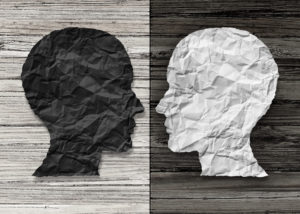Borderline personality disorder (BPD) is one of the most common personality disorders in the world, as millions of people struggle with it on a daily basis. This specific disorder frequently occurs with other conditions that impact mental health, and alcoholism is one of the most common.
What is Borderline Personality Disorder?
BPD is a mental health disorder that affects the way people feel, behave, and think. People who have borderline personality disorder may experience the following symptoms:
- Paranoia
- Impulsivity
- Aggression
- Intense anger
- Severe anxiety
- Low self-esteem
- Unstable emotions
- Episodes of depression
- Distorted or unhealthy self-image
Many people who have BPD struggle to develop meaningful and healthy relationships. They may seem to be manipulative as their disorder can make it difficult for them to truly relate to and understand what others are feeling. Sometimes, people who have borderline personality disorder suffer from an intense fear of abandonment or being alone. This can lead them to build or remain in harmful and unhealthy relationships with friends, family members, or romantic partners.
In many cases of BPD, individuals develop eating disorders and struggle to take good care of themselves. Some people who have borderline personality disorder develop suicidal ideation, thinking about and even attempting to commit suicide.
Self-care also becomes less important to individuals who have BPD as they seek comfort in substances such as alcohol. Many times, people use alcohol in order to feel its sedative effects. They often find relief in alcohol use, but the effects are only temporary.
In order to continue feeling the relief and effects that come as a result of alcohol use, individuals continue to drink the substance. Eventually, their bodies become dependent on alcohol and, with time, the individuals become addicted to it. As a result, individuals begin to suffer from the effects of both borderline personality disorder and substance abuse.
Borderline Personality Disorder and Alcoholism: Addiction-Causing Symptoms
Borderline personality disorder has a variety of symptoms that make it increasingly complicated for an individual to live a normal life without encountering obstacles put into place by this specific mental illness. Some of the most challenging symptoms of borderline personality disorder can become so disruptive that they lead to the development of additional issues, such as alcoholism.
There are numerous ways in which alcoholism can occur as a result of borderline personality disorder and its symptoms, including the following causes of alcoholism:
- Impulsivity – Impulsive behaviors such as unprotected sex, shopping sprees and more, might not seem like a trigger for alcohol abuse; however, it is often one of the main causes. Impulsivity plays into an individual’s need for immediate gratification, meaning it makes them more susceptible to give in to drinking more than planned, often leading to the development of alcoholism.
- Depression – This is one of the most common side effects associated with BPD, and most individuals who struggle with it also battle suicidal tendencies as well. This type of self-loathing and worthlessness that comes along with this disorder can cause an individual to find solace at the bottom of a bottle. As their depression continues, individuals might drink in excess more frequently, causing habitual drinking behaviors to develop.
- Frequent mood swings – Individuals who have borderline personality disorder often experience numerous mood swings – one minute they are completely euphoric and the next, they are experiencing massive bouts of depression. To help stabilize their mood, individuals might begin drinking as a form of self-medicating, especially if their borderline personality disorder is not already being treated.
These main symptoms, as well as participation in destructive behaviors, experiencing loneliness and having difficulty maintaining healthy relationships, can all serve as the underlying factors for an individual who has borderline personality disorder to become an alcoholic.
Treatment for Borderline Personality Disorder and Alcoholism
When an individual is struggling with borderline personality disorder and alcoholism (a substance abuse problem and mental illness) he or she is diagnosed as having a dual diagnosis. This is extremely common, as most people who suffer from mental illnesses find themselves self-medicating through the use of substances such as alcohol.
There is specific treatment for this kind of diagnosis, as rehab centers will work with individuals to simultaneously address both their borderline personality disorder and drinking. This usually occurs when a therapist helps an individual utilize numerous behavioral therapies and then combine them with psychotherapy that can help uncover the root of their abuse.
In the end, both professional treatment for the personality disorder and the substance abuse problem can help an individual overcome his or her struggles with both disorders in ways that help promote their successful recovery.
Northbound Treatment for BPD and Alcohol Abuse
Alcoholism, followed by cocaine and opiate abuse, is the disorder that most commonly affects people who have BPD. A recent study showed that around 63% of participants in the study who had borderline personality also had alcohol use disorders. Inversely, the study also showed that those with alcohol use disorder were 3.35 times more likely to be diagnosed with BPD.
Personality disorders commonly occur with other illnesses (ex. BPD and alcohol abuse) and can be difficult to diagnose. So, in order to combat the symptoms associated with borderline personality disorder and alcoholism, we offer specialized treatment for those who suffer from BPD and alcohol abuse.
The most powerful of these treatments uses a cognitive behavioral approach. Our skilled and experienced clinical staff will help the patient become more aware of other people’s perspectives and how to react and interact with them.
On occasion, it may be necessary to prescribe medication in addition to treating the patient through therapy. Certain psychiatric drugs, such as anti-depressants, can be exceptionally effective when combined with individually tailored therapeutic techniques. In more extreme cases, it may also be necessary to prescribe anti-psychotic drugs.
However, Northbound always strives to use medication as sparingly as possible, and only when under the direction of an experienced psychiatrist as part of an integrated treatment plan. We encourage you to take a moment to learn about our Medication-Assisted Therapy (MAT).
If you or someone you love is suffering from personality disorder and alcoholism, now is the time to reach out for help. Just contact us by calling (855) 858-6803.











